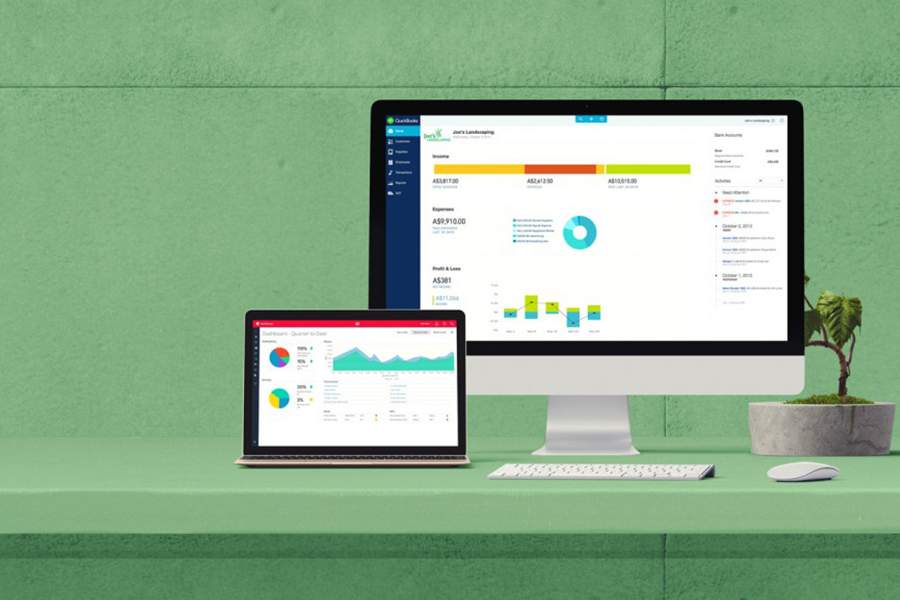QuickBooks Enterprise is available in four subscription plans: Silver, Gold, Platinum, and Diamond. We recommend exploring Silver, the entry-level option, to see if it fits your accounting needs. However, if you have employees and can file taxes effectively on your own, go for the Gold tier. If you require more specialized features like advanced inventory and intercompany transaction management, Platinum might be suitable for you. Finally, to unlock the full features and benefits of QuickBooks Enterprise, get Diamond.
Here are specific scenarios where we recommend each QuickBooks Enterprise plan:
- QuickBooks Enterprise Silver: Best for midsize businesses with simple inventory accounting needs and outsourced payroll
- QuickBooks Enterprise Gold: Best for businesses managing their own payroll
- QuickBooks Enterprise Platinum: Best for businesses needing extensive inventory management features and managing multiple entities
- QuickBooks Enterprise Diamond: Best for larger businesses seeking assisted payroll, additional user capacity, time tracking, and Salesforce CRM integration
QuickBooks Enterprise Plans Comparison: Pricing
Local Version
The table below summarizes the pricing information for the locally installed version of QuickBooks Enterprise.
Visit QuickBooks Desktop Enterprise
Cloud Version
If you wish to take QuickBooks Enterprise to the cloud, you can purchase a cloud-hosted version of the software, which is available only on a monthly subscription. Your total monthly subscription is determined by your hosting level (Core, Classic, or Deluxe) and your Enterprise subscription.
Your total monthly price for hosting and the software is summarized in the table below.
Visit QuickBooks Desktop Enterprise
QuickBooks Enterprise Plans Comparison: Features
Silver | Gold | Platinum | Diamond | |
|---|---|---|---|---|
Maximum Number of Users | ✓ | ✓ | ✓ | ✓ |
Online Backup & Data Storage | ✓ | ✓ | ✓ | ✓ |
Industry-specific Editions | ✓ | ✓ | ✓ | ✓ |
Advanced Reporting | ✓ | ✓ | ✓ | ✓ |
Priority Circle Membership | ✓ | ✓ | ✓ | ✓ |
Training Tools | ✓ | ✓ | ✓ | ✓ |
Enhanced Payroll | ✕ | ✓ | ✓ | ✓ |
Advanced Inventory Management | ✕ | ✕ | ✓ | ✓ |
Advanced Pricing Management | ✕ | ✕ | ✓ | ✓ |
Intercompany Transactions | ✕ | ✕ | ✓ | ✓ |
✕ | ✕ | ✓ | ✓ | |
QuickBooks Desktop Assisted Payroll | ✕ | ✕ | ✕ | ✓ |
QuickBooks Time Elite | ✕ | ✕ | ✕ | ✓ |
Salesforce CRM Connector | ✕ | ✕ | ✕ | ✓ |
Which QuickBooks Enterprise plan is best for you?
QuickBooks Enterprise Silver vs Gold
Silver | Gold | |
|---|---|---|
Pricing (Local) |
|
|
Cloud Hosted Version Pricing ($/Month) |
|
|
Scalability | Up to 30 users | Up to 30 users |
Access All Core Features of Enterprise | ✓ | ✓ |
QuickBooks Desktop Enhanced Payroll | ✕ | ✓ |
When Silver Is Sufficient
If you are primarily focused on the standard features offered by QuickBooks Enterprise, then Silver is enough. It has all the core features of Enterprise, including basic inventory management, basic pricing management, Priority Circle membership, and advanced reporting. Another reason you may prefer Silver is if you outsource your payroll or use a different payroll system to pay your employees since the entry-level plan excludes the payroll option.
When to Upgrade to Gold
You Pay & File Payroll Taxes on Your Own
We recommend the Gold version for businesses that want to process their own payroll and can effectively file and pay payroll taxes on their own. The only difference between QuickBooks Enterprise Silver vs Gold is that the latter includes free access to QuickBooks Desktop Enhanced Payroll.
It’s a self-service option that handles payroll tasks, such as calculating paychecks, managing tax withholdings, and generating tax forms. With Enhanced Payroll, you can enter employee hours, make necessary deductions, and generate paychecks or direct deposits.
It also helps with filing and paying payroll taxes and generating tax forms such as W-2s and 1099s. It even provides access to payroll reports. However, note that you are responsible for paying and filing your own taxes.
QuickBooks Enterprise Gold vs Platinum
Gold | Platinum | |
|---|---|---|
Pricing (Local) |
|
|
Cloud Hosted Version Pricing ($/Month) |
|
|
Scalability | Up to 30 users | Up to 30 users |
Access All Core Features of Enterprise | ✓ | ✓ |
Advanced Inventory Management | ✕ | ✓ |
Advanced Pricing Management | ✕ | ✓ |
Intercompany Transactions | ✕ | ✓ |
Bill & PO Workflow Approvals | ✕ | ✓ |
When Gold Is Sufficient
Apart from those who can file their own taxes confidently, QuickBooks Gold could be sufficient for businesses with one location and those operating with relatively low inventory levels.
When to Upgrade to Platinum
Your Business Relies Heavily on Inventory Management
Whether you are a retail chain with multiple locations or a manufacturing firm dealing with serialized items, Platinum offers inventory management features beyond those found in Gold. Platinum lets you perform advanced inventory management tasks, like the ability to use serial and lot numbers to track items, monitor inventory across multiple locations, assign bin locations to items, and use barcode scanners.
You Have Sophisticated Pricing Structures
Businesses with complex pricing structures—such as those with tiered pricing, volume discounts, and seasonal pricing adjustments—should consider upgrading to Platinum. All Enterprise plans allow you to set up basic pricing, but Platinum takes it one step further by allowing you to create pricing rules based on various criteria.
For example, you can create rules that offer discounted prices for bulk purchases and promotional periods. You can also set up rules for special pricing for preferred customers and implement automatic price adjustments based on cost fluctuations.
You Have Complex Procurement Processes
Another reason to upgrade to Platinum is that you want to streamline your accounts payable (A/P) processes with bill and PO approval workflows. This feature enables you to set up custom rules and permissions to assign team members responsible for reviewing and approving bills or purchase orders before they are processed.
You Manage Multiple Business Units
A new feature in Platinum and Diamond, intercompany transaction management allows businesses to track and manage their financial activities between multiple entities efficiently. Enterprise provides a single dashboard where you can set up and track multicompany transactions and generate consolidated reports that can help you monitor the overall health of your company.
QuickBooks Enterprise Platinum vs Diamond
Platinum | Diamond | |
|---|---|---|
Pricing (Local) |
|
|
Cloud Hosted Version Pricing ($/Month) |
|
|
Scalability | Up to 30 users | Up to 40 users |
QuickBooks Desktop Assisted Payroll | ✕ | ✓ |
QuickBooks Time Elite | ✕ | ✓ |
Salesforce CRM Connector | ✕ | ✓ |
When Platinum Is Sufficient
If you are satisfied with the features offered in Platinum and don’t require any specialized features or additional user capacity, then you likely don’t need Diamond, the highest QuickBooks Enterprise tier. We believe that Platinum is sufficient for most businesses, unless they require enhanced scalability or additional assistance filing payroll tax returns and have complex processes that require integrations.
When to Upgrade to Diamond
You Require Assisted Payroll Tax Filing
If you don’t have the time and expertise to handle your own taxes, then we recommend going with Diamond. While both the Gold and Platinum plans include Enhanced Payroll, Diamond offers an even more advanced payroll option, Assisted Payroll, which lets you offload the entire payroll process to QuickBooks. This means it will take care of all the tasks involved in payroll processing, including paying and filing taxes.
You Require Advanced Time Tracking Features
Diamond includes free access to QuickBooks Time Elite, the advanced version of QuickBooks Time. Besides basic time tracking features—like clock-in and clock-out, time-off management, and employee scheduling—Elite has advanced tools, such as mileage tracking, geofencing, and project tracking.
You Use Salesforce as Your CRM Customer Relationship Management Software
If you rely on Salesforce and want to integrate it with QuickBooks, you’ll need to upgrade to the Diamond plan. The Salesforce CRM Connector in the Diamond plan syncs customer and sales data between the two platforms. This allows you to better track customer interactions, including sales orders, invoices, and payment history—helping you improve reporting and forecasting.
How We Evaluated QuickBooks Enterprise Plans
We evaluated the QuickBooks Enterprise plans based on several factors, including the following:
- Pricing: QuickBooks Enterprise plans are priced differently, with the cost per user increasing as you move up to higher tiers. However, all plans offer tiered pricing for additional users, so as you add more seats, the price per cost is reduced.
- Ease of Use: QuickBooks Enterprise has a learning curve, but we find the higher plans more difficult to use primarily because of the advanced features included.
- Scalability: The Diamond plan allows you to add up to 40 users, whereas you can only add up to 30 across all the other lower plans.
- Advanced Features: We evaluated the additional services included in higher-priced plans, such as advanced inventory, advanced pricing, and assisted tax filing. We believe these advanced features are essential for large businesses with complex business processes.
- Integration Capabilities: We considered each plan’s ability to integrate with other business applications. While QuickBooks Enterprise typically has a few integrations available, Diamond has a strong focus on CRM integration with its Salesforce CRM connector.
Based on the pointers and QuickBooks Enterprise plan differences we discussed above, here are the factors to keep in mind when choosing the right plan.
- Business size: If your team may not exceed 30 users and you only need the core features of QuickBooks Enterprise, then you may want to explore Silver. For larger businesses, Diamond, which supports up to 40 users, may be the best option.
- Budget: Consider the cost of each version, but also don’t solely focus on it. For instance, if the extra features in the next tier will significantly save time and improve your workflows, then the additional price may be worth it in the long run.
- Desired features: Determine what specific features you need to support your business process. For example, if you heavily rely on inventory management, you might want to choose between Platinum and Diamond.
- Payroll needs: If you outsource your payroll, Silver may be sufficient. If you have employees and you can confidently manage your own payroll and file your own payroll taxes, you might settle with Gold. If you require assisted payroll, then Platinum or Diamond can be a great choice.
- Future Growth: Think about how your needs may change and what features you might need in the future. Then, consider whether a higher plan is suitable to accommodate that growth.
Frequently Asked Questions (FAQs)
The key differences lie in the cost and the features offered. Higher-tier plans provide additional advanced features, such as advanced inventory management and advanced pricing, and specialized services, such as Assisted Payroll.
The plan for you depends on several factors, such as your budget, the size of your business, and the features you need. If you have a limited budget and only need standard features, such as inventory tracking and advanced reporting, Silver is great. If you have more complex requirements, you may upgrade to a higher plan that offers the additional features you need.
Yes, but it requires a hosting service. If you purchase cloud access at the same time as purchasing your new QuickBooks Enterprise subscription directly from QuickBooks. You might want to check out our list of the best QuickBooks hosting providers if you want to take your existing Enterprise subscription online.
Yes, QuickBooks Enterprise offers tiered pricing where additional users can be added for a lower cost than the first user.
Bottom Line
When deciding between QuickBooks Enterprise Silver, Gold, Platinum, and Diamond, you must carefully assess your business needs, budget, and desired features. Choose a plan that provides the right balance of functionality, value for money, and scalability to support your business’s growth and unique business requirements.


